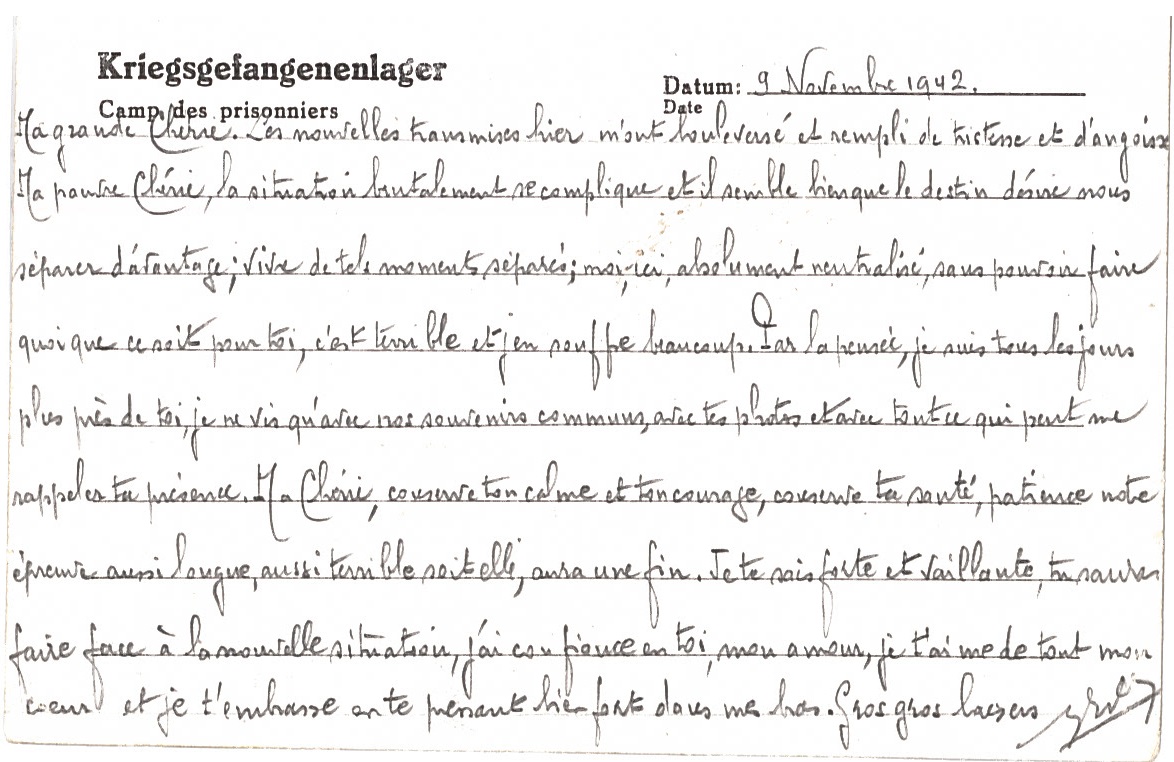The ICRC’s archives and library collections contain millions of documents that date back as far as 1863. They form an invaluable legacy on the evolution of ICRC’s action and the development of international humanitarian law to better protect those affected by wars.
But they are so much more than the history of an institution and of international law. Going through them is like embarking on a journey over the past 150 years during some of the darkest periods of modern humankind: they depict stories of pain, sorrow, loss, disappearances, deaths, massacres, as well as resilience, hope, survival and commitment. In some cases, they are the only evidence of a person’s suffering, or even existence.

Millions of documents in our archives and as many personal stories of people caught in conflict. Pictured here is a letter from a WWII prisoner of war (ICRC Archives).
These archives don’t belong solely to the ICRC. They are part of the history of nations and foremost of the people ICRC sought to protect and assist. Our WWII archives contain for example more than 36 million of cards containing each a name; sometimes it’s a prisoner of war, duly registered, other times it’s a tracing request, coming from families desperate for news of their loved ones in the total chaos and terror that engulfed the world.
Decades later, families contact us seeking information on their own history. Some continue to approach us restlessly, year after year, on their missing next of kin, with the hope of finally moving forward in their grieving. Entire nations that suffered from armed conflict are undergoing the same journey, in an effort to reconcile and move forward as one people. ICRC archives offer a unique glimpse of their past and may answer their quest. Unfortunately, most documents are physical and not searchable online, with the notable exceptions of WWI prisoners of war archives, the audiovisual archives and part of our public literature. Scholars who opt to study the International Relief Agency for wounded and sick soldiers, the forerunner of the actual International Tracing Agency, set up during the Franco Prussian war (1870 -1871), would need to book a trip to Geneva; families looking for their relative detained during WWII would need to write to ICRC, knowing that the ICRC is only capable of accepting incoming requests 3 times a year, for a day, now reduced to 45 minutes due to the massive influx of requests.

The millions of nominative index cards and tracing requests treated by the ICRC during WWII are now part of its archives. References (from left to right): V-P-HIST-00407-03, V-P-HIST-03574-03, V-P-HIST-03573-35, V-P-HIST-03570-22.
The only way forward is embarking on a large digitization program that will help people access their information through an online dedicated portal. Already now, the existing ICRC archival and library portals receive more than 130’000 visitors a year -and this represents just a portion of our collections. In 2019, the ICRC Assembly adopted the Strategy on ICRC’s Archives, Records and Library Collections, acknowledging the wider call for an enhanced online access to information. The pandemic of Covid-19 and resulting lockdowns further added pressure on archival services to offer an alternative to the classical in situ consultation.
Digitizing our archives will allow access to hundreds of millions of data contained in our archives, thereby increasing cross-references and analysis to a level that would have been impossible in their original format. Currently under construction, a project led by our protection department is exploring new technologies to cross data from various series of archives and increase the level of efficiency in searching for missing people. This is just one example of the potential of what could be achieved through the digitization of our archives.
Do you have ideas or experience that can help us find resources and/or partners, any expertise worth sharing with us? Don’t hesitate to leave us a comment below.


Great plans!
I’m not an expert and can’t offer technical advice – but should you ever need volunteers, I would help out in my free time. Just contact me by mail.
I’m a retired delegate (with quite some Prot experience).
Good luck!
Chris